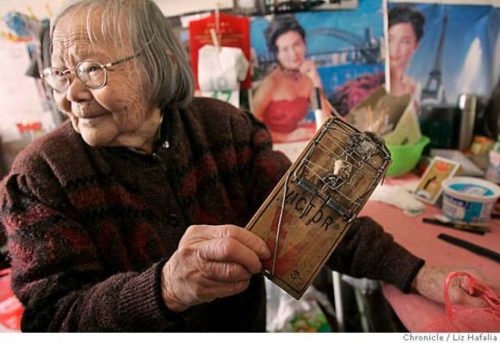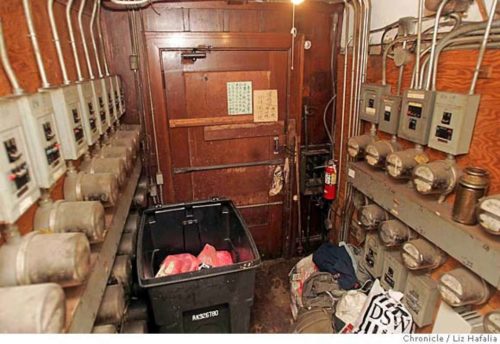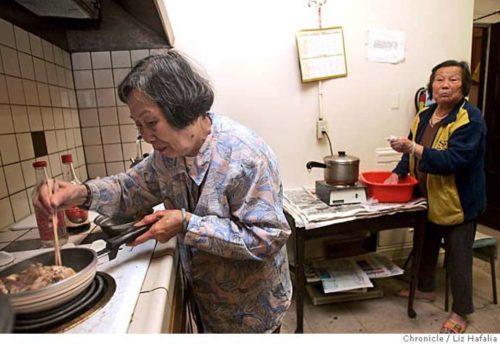
CHINATOWN20_053_LH.JPG Qiong Zhen Xu (cq), 84 years old, carrying the 39th mouse she caught in her trap since the month of March. A Chinatown group reports on rampant substandard living conditions in the neighborhood�s rental housing. Photographed by Liz Hafalia on 9/20/05 in San Francisco, California. SFC Creditted to the San Francisco Chronicle/Liz Hafalia
Qiong Zhen Xu marks her calendar with a black pencil every time she catches a rodent in her narrow room in a small building on Broadway in San Francisco’s Chinatown.
Using wooden traps she sets each night, she has killed 39 since March in the room she has rented for a decade. Rats have chewed through the lining of a fuzzy jacket of hers and through one of her felt slippers, she said, pointing out the damage.
Xu, 84, was one of 197 tenants in 157 apartment buildings and single-room-occupancy hotels the Chinatown Progressive Association surveyed last winter for housing, health and fire code violations.
About 60 percent of all housing units in Chinatown are single rooms without bathroom or kitchen; most of the rest are rental apartments. Low-income-housing activists say gentrification has largely bypassed Chinatown.

CHINATOWN20_004_LH.JPG This one garbage can is shared with 30 apartments. A Chinatown group reports on rampant substandard living conditions in the neighborhood�s rental housing. Photographed by Liz Hafalia on 9/20/05 in San Francisco, California. SFC Creditted to the San Francisco Chronicle/Liz Hafalia
In the survey, 87 percent of tenants reported at least one code violation, and 62 percent reported multiple violations. About 35 percent said their unit was infested with rodents or insects, a quarter cited unsanitary conditions in common areas of their building, 24 percent said the building was noisy and 22 percent complained of lack of heat. The surveys were conducted in Chinese from October 2004 through February 2005.
Only 28 percent of tenants had complained about the housing problems to their landlord, however, and 11 percent reported complaining to a government agency or community organization.
Xu complained to her building manager, but to no avail, she said Monday. She has not reported the problem to authorities.
“It’s no use,” she said in Toisanhua, a dialect of the Guangdong province in southern China, the main dialect spoken in San Francisco’s Chinatown.

CHINATOWN20_014_LH.JPG This one working stove is shared by 30 units in the complex. Wen Hua Lin, 77 years old, makes herself some lunch. A Chinatown group reports on rampant substandard living conditions in the neighborhood�s rental housing. Photographed by Liz Hafalia on 9/20/05 in San Francisco, California. SFC Creditted to the San Francisco Chronicle/Liz Hafalia
The former peasant never attended school and, since she immigrated about 12 years ago, has learned only how to scratch out her name. After her daughter and her family moved to Concord, Xu stayed behind in Chinatown, where she can get around by herself. She said she pays $247 per month for her room.
By comparison, in the Tenderloin, people are more willing to complain, said Randy Shaw, director of the Tenderloin Housing Clinic.
“In Chinatown, there has always been overcrowding and unique cultural and language barriers,” Shaw said.
In the Mission District, home to a large working-class Latino population, many of the same problems arise as in Chinatown, said Richard Marquez, coordinator of the activist group Mission Agenda.
“We’re seeing neglectful landlords,” said Marquez. He said gentrification has caused certain Mission landlords to be less responsive because they want to drive out tenants and sell their property.
“They believe tenants who are low-income and immigrants and of color are the least likely to access services and obtain the information necessary to defend themselves,” Marquez said of some landlords.
San Francisco’s rent-control laws may also dissuade landlords from making repairs if they feel they won’t recoup the cost, said Tommy Avicolli Mecca, director of the counseling program at the Housing Rights Committee of San Francisco.
“They’re not going to bother, if they’re not making as much money as they think they should,” Avicolli said.
To address the code violations, the Chinatown Progressive Association suggested increasing fines; subsidizing a special janitorial company that would maintain residential hotels; and requiring property managers to receive training on landlord responsibilities, among other remedies. The association also suggested raising city fees with the revenue going to code enforcement.
“The recommendations are on point, and we need to flesh out the details,” said Rajiv Bhatia, director of the Occupational and Environmental Health Section of the city Department of Public Health. “Most of the problems people are reporting are avoidable. With regards to nighttime noise, trash receptacles could be stored on the ground floor. Buildings can be rodent-proofed by sealing up cracks and holes. With regards to unsanitary bathrooms and kitchens, facilities require improvements that are of institutional grade.”
The city already funds tenant-education programs that inform residents of their rights and how to report fire safety and other building code problems, city officials said.
The survey found more health violations than housing or fire code problems, said Gordon Mar, director of the Chinese Progressive Association.
“This could be due, in part, to the fact that there are existing tenant outreach programs focused on housing and fire code enforcement,” said Mar. The association urged spending $200,000 of the Tourist Hotel Tax Fund on expanded health code enforcement.
To report a violation
Contact S.F. Housing Inspections Service at the Department of Building Inspections (415) 558-6220 or the Department of Public Health’s Environmental Health Division complaint line, (415) 252-3805.
by Vanessa Hua (SF Gate)